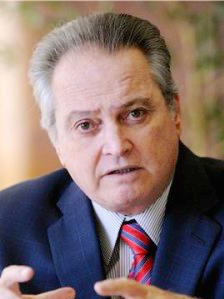SAO PAULO, (Reuters) – Brazilian President Dilma Rousseff’s seven-month-old government sunk further into crisis yesterday as a fourth minister quit and another top aide publicly questioned whether the leader would seek reelection or step aside in 2014 for her much more popular predecessor.

Agriculture Minister Wagner Rossi submitted his resignation after top aides were accused of graft. His departure is likely to deepen a public confrontation between Rousseff and the PMDB party, to which Rossi belonged, that has exploded into open view in recent days.
Rousseff has been engaged in a risky anti-corruption drive that has earned her support among some in Brazil’s middle class, but has alienated allied parties whose support she needs to maintain a steady hand on the economy.
The steady departure of top aides since Rousseff took office on Jan. 1, plus clear signs of an economic slowdown in recent months, has created the impression of disarray in her government. Some top legislators have threatened open rebellion, including the PMDB’s lower house leader Henrique Eduardo Alves, who spoke this week of “protests … until Congress gets the respect we want.”
Alves did not specify what he meant, but some close to Rousseff fear that dissident legislators could pass bills allowing heavy government spending, which could in turn damage her fight against high inflation.
Meanwhile, Communications Minister Paulo Bernardo added to the sense of weakness by stating that Rousseff might not seek a second term in 2014, and instead cede the candidacy to President Luiz Inacio Lula da Silva.
Bernardo, who is close to both of them, said that Rousseff was the likely candidate for her party “if she has the desire to run.” But he said she would first need to discuss the matter with former Lula.
“I don’t see that question being resolved without a conversation between the two of them. It’s very early still,” Bernardo said in an interview published on the website of newspaper Folha de S.Paulo.
LULA STILL
WILDLY POPULAR
The 65-year-old Lula, who governed from 2003 to 2010, was forbidden by law from running for a third consecutive term. He plucked Rousseff from relative obscurity to be his successor, raising expectations among some Brazilians from the very beginning that she might step aside for him to run again.
A government official told Reuters last week that Rousseff has often floated the idea of not running again in private conversations, although the assumption in the presidential palace remains that she will. The official spoke on condition of anonymity because of the sensitivity of the issue.
Lula enjoys a near-mythical reputation among many Brazilians who credit the former labor leader with lifting millions from poverty during his two-term presidency. He left office with approval ratings of about 80 percent.
Rousseff, 63, remains popular but has struggled to emulate Lula’s charisma or connection with Brazil’s working classes.
Part of Lula’s popularity came from surging growth lifting millions of people out of poverty. Brazil’s economy surged 7.5 percent last year, its fastest growth in 24 years.
In contrast, the economy has shown signs of strain this year. In fact, analysts say, gross domestic product might be lucky to grow as much as half the 7.5 percent rate this year. A key economic activity index even showed an unexpected contraction in June from May, according to Wednesday data.
Lula has kept a high public profile since leaving the presidency and earlier this year returned to the political stage in Brasilia to soothe concerns of disgruntled members of the ruling coalition.









